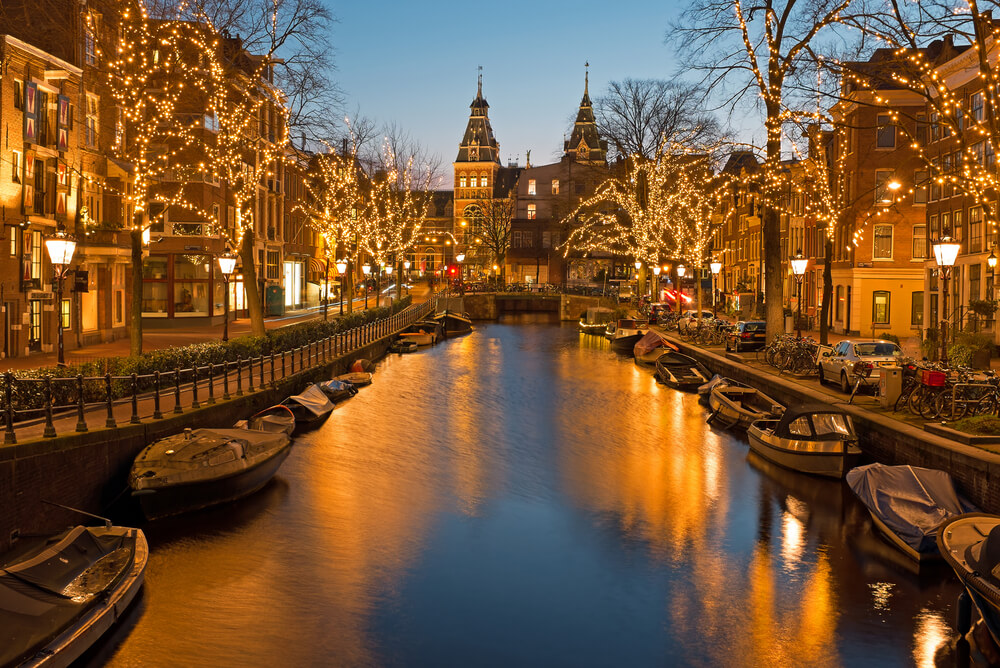With picture-perfect towns and eclectic cities, there’s so much to do in this historically rich, urban landscape. Relive history at the esteemed Anne Frank Museum or take in the scenic landscapes framed by 17th century windmills and vibrant tulips in Spring.
Ranked the fifth happiest country in the world in 2022,1 the Netherlands is the ideal getaway for those who need a vacation away from home. However, for the ultimate carefree holiday, consider getting travel insurance. Keep reading to find out why.
Although the Netherlands is known for being one of the safest countries in the world, it doesn’t mean it’s completely free of accidents, petty crimes and unforeseen illnesses. For example, theft and bicycle accidents are extremely common in the Netherlands,2 which is why it’s smart to be protected.
Anything can go wrong on any holiday, whether it’s simply bad weather or an issue with your health. Not only can travel insurance financially protect you from the unexpected, but it can also provide peace of mind so that you can kick back and focus on the important things, like shopping for Dutch gin and munching on stroopwafel.

What your travel insurance should cover will depend on your itinerary. With the proper preparation, travel insurance can be a great way to cover your bases on your trip away.
For the most part, the Netherlands is a safe country for tourists to visit; however, general theft such as pickpocketing (especially while waiting for public transport) and theft from cars is common, particularly in Amsterdam.2
If someone steals your cash, pickpockets your belongings or damages your luggage, your travel insurance cover may reimburse you for all or a large portion of those losses.
The Netherlands is famous for their love of bicycles; it’s a great way for locals and tourists alike to travel and see the sites. In fact, there are more bicycles in the country than people, with approximately 23 million bicycles compared to the 17 million residents.
With so many bicycles abound, it means that injuries are common. Travel insurance can cover the unexpected hospital cost and medical treatment that can come with accidents like these, provided you follow the country’s road rules and are responsible. Insurance can also cover medical expenses for illnesses and other injuries if the Australia-Netherlands Reciprocal Health Care Agreement doesn’t already cover it.
In the event of a medical emergency, your travel medical insurance can also cover your evacuation or repatriation back to Australia.
On any trip, there’s always the possibility of missed flights and cancelled or delayed travel, which might involve unexpected accommodation costs and missed or cancelled tours, tickets and events. You might also fall ill and need to cancel the rest of your trip to return home.
In these instances, your travel insurance policy can cover some, or all, of these costs, so you’re not paying for experiences you didn’t get to have.
Perhaps you’d like to try your hand at climbing the tallest free-standing climbing wall, Excalibur, in Groningen. Or maybe you’d like to go bungee jumping off Scheveningen Pier at the Hague.
If you’re keen on adventure, you may want to get adventure cover added to your general travel insurance policy. While many policies will cover a few or a wide range of adventure sports and activities, always check your Product Disclosure Statement to know what cover you have. For the more extreme adventure sports and activities you will need specialised cover. Without this, your insurer may reject any claims related to adventure activities.
To enjoy winter activities like ice-skating on the canals of Amsterdam or indoor skiing, you should consider snow and ski cover. Like adventure cover, your insurer may reject any claims related to snow sports activities unless you have this additional level of cover.
Without this cover, if you injure yourself on the slopes, any medical costs may need to be paid out of your pocket, which is enough to put a downer on anyone’s holiday.
Planning on driving? Rental car excess and motorcycle and scooter cover will come in handy in cases of accidents or theft. Your insurer can often cover the rental company excess that comes with many misfortunes.
Every travel insurance policy has terms, conditions, limits and sub-limits, and so may not cover you in certain circumstances. In general, you may not be covered for the following:
Find out more about other common exclusions. For policy-specific exclusions, read the Product Disclosure Statement (PDS) provided by your insurer.
The Netherlands is one of the safest countries you can travel to. Most Dutch people are also fluent in English, so you probably won’t encounter many language barriers. However, there is always some risk in all countries, especially when it comes to travelling.
Travelling in a foreign country with different customs and laws can put you in a vulnerable position. Make sure you’re well prepared and watch out for pickpockets, as tourists are often easy targets.

The Netherlands has an abundance of great cultural works, from the esteemed works of Van Gogh and M.C. Escher to quirky monuments littered throughout the country.
With hundreds of interesting museums and sights to see, you’ll want to book in advance if you want to avoid long queues.
You may also want to consider getting an I Amsterdam City Card for major attractions and city-wide transport in Amsterdam, including rental bikes and canal cruises.
Bike thieves are much more common (and savvy) than you’d think, so lock your bike twice if you can – once at the wheel and again at the frame – to deter thieves. Keep a close eye on your bike, and don’t buy suspiciously cheap bikes off the street because it’ll likely be stolen; both you and the thief can get fined for handling stolen bikes.
The official currency used in the Netherlands is the euro. While the Netherlands are slowly moving towards becoming a cashless society, cash is still preferred over credit cards in most places. Credit cards aren’t popular, and you may have trouble using any non-European debit cards.
While it’s a good idea to carry cash on you, there is one type of card used across the Netherlands; the Dutch rely heavily on Maestro cards. In fact, certain shops, such as Albert Heijm (Holland’s largest supermarket chain), won’t accept any other type of card.
A Maestro card is a type of debit card that works like a Mastercard or Visa card. It works at ATMs and point of sales (POS) as a contactless, swipe or insertion payment, just like any other card. The only difference is that it doesn’t have a CVV number, and the expiry date isn’t written on the card, making it less secure than other types of cards.
If you’re using an Australian passport, you can travel through the Schengen area for 90 days without needing to apply for a Schengen visa. The Netherlands is one of the 26 countries in the Schengen area where Australian residents can travel visa-free for business or tourist reasons.
Please note: As of September 2022, the EU entry ban requires visitors to the Netherlands to be fully vaccinated against COVID-19 (coronavirus) and show their vaccination certificate before being allowed entry to any EU countries.3

If you’re looking to get travel insurance for the Netherlands, try using our travel insurance comparison service to compare a variety of policies from some of Australia’s best-known insurers.
It’s simples to find great-value travel insurance plans.
Curious about travelling to other parts of Europe? Find out more about getting cover for other countries.
1 World Happiness Report. (2022). Happiness, Benevolence, and Trust During COVID-19 and Beyond. Accessed September 2022.
2 Expatica. (2020). General safety in the Netherlands. Accessed September 2022.
3 Government of the Netherlands. (2022). Travelling to the Netherlands with proof of vaccination. Accessed September 2022.